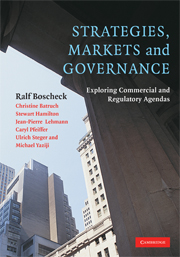Book contents
- Frontmatter
- Contents
- List of Figures, Boxes and Tables
- Acknowledgments
- Preface
- Notes on Contributors
- Part I Introduction and overview
- Part II Firm-level
- 2 Competitive advantage and the regulation of dominant firms
- 3 Delegating regulation: Supply-chain management, partnering and competition policy reforms
- 4 Diffusion of corporate governance regulation: France, Germany, the UK and the USA
- 5 Corporate governance after Enron et al.
- 6 Tackling healthcare fraud!?
- 7 Watchdog and proxy war campaigns against firms
- 8 Oil and conflict: Lundin Petroleum's experience in Sudan
- Part III Industry-level
- Part IV Country/International level
- Part V An observation in closing
- Index
8 - Oil and conflict: Lundin Petroleum's experience in Sudan
Published online by Cambridge University Press: 06 July 2010
- Frontmatter
- Contents
- List of Figures, Boxes and Tables
- Acknowledgments
- Preface
- Notes on Contributors
- Part I Introduction and overview
- Part II Firm-level
- 2 Competitive advantage and the regulation of dominant firms
- 3 Delegating regulation: Supply-chain management, partnering and competition policy reforms
- 4 Diffusion of corporate governance regulation: France, Germany, the UK and the USA
- 5 Corporate governance after Enron et al.
- 6 Tackling healthcare fraud!?
- 7 Watchdog and proxy war campaigns against firms
- 8 Oil and conflict: Lundin Petroleum's experience in Sudan
- Part III Industry-level
- Part IV Country/International level
- Part V An observation in closing
- Index
Summary
Introduction
Lundin Petroleum obtained the rights to explore for and produce oil and gas in concession Block 5A, Unity State, Sudan, in February 1997; it sold these rights in June 2003.
During the period in which the company was active in Sudan, it operated in the belief that oil could benefit the economic development of the area and the country as a whole, and that this would have a catalyzing effect on the peace process. The problems which it encountered in the area, however, led the company to constantly reassess its activities, role and responsibilities there.
This chapter examines the reasons why Lundin decided to operate in Sudan, the challenges it faced in the course of its activities, the steps it adopted to satisfy both its commercial objectives and ethical concerns, and its efforts to promote a peaceful resolution of the conflict.
Sudan's war
Sudan has been embroiled in a civil war that began shortly after it gained independence from the UK in 1956. It is one of the longest and most tragic wars of modern history: fighting has taken place for nearly 50 years, with a single reprieve between 1972 and 1983. The Government of Sudan and the Sudan People's Liberation Movement/Army (SPLM/A), led by rebel leader John Garang, are the main protagonists in the conflict which resumed in 1983, although armed militias in different parts of the country have also been involved at various times.
- Type
- Chapter
- Information
- Strategies, Markets and GovernanceExploring Commercial and Regulatory Agendas, pp. 134 - 148Publisher: Cambridge University PressPrint publication year: 2008

